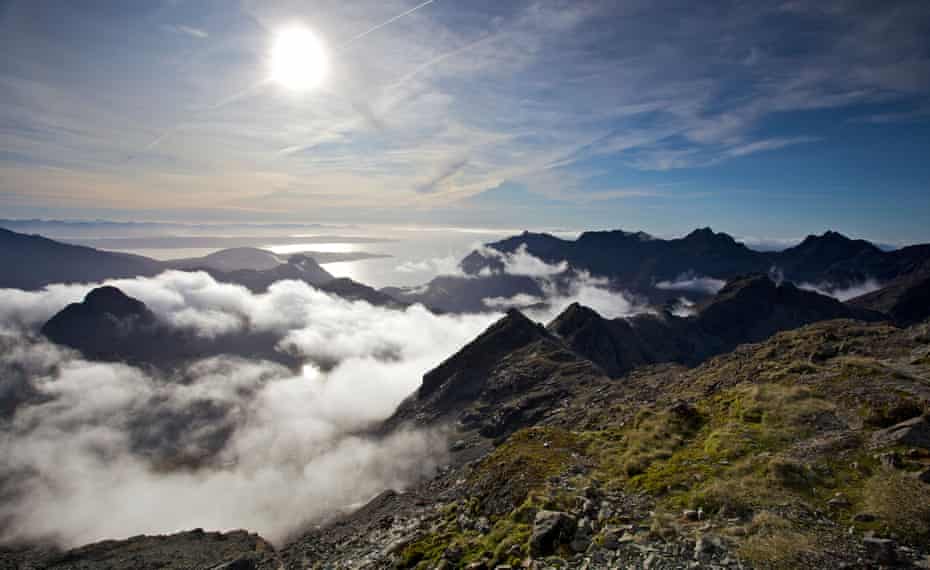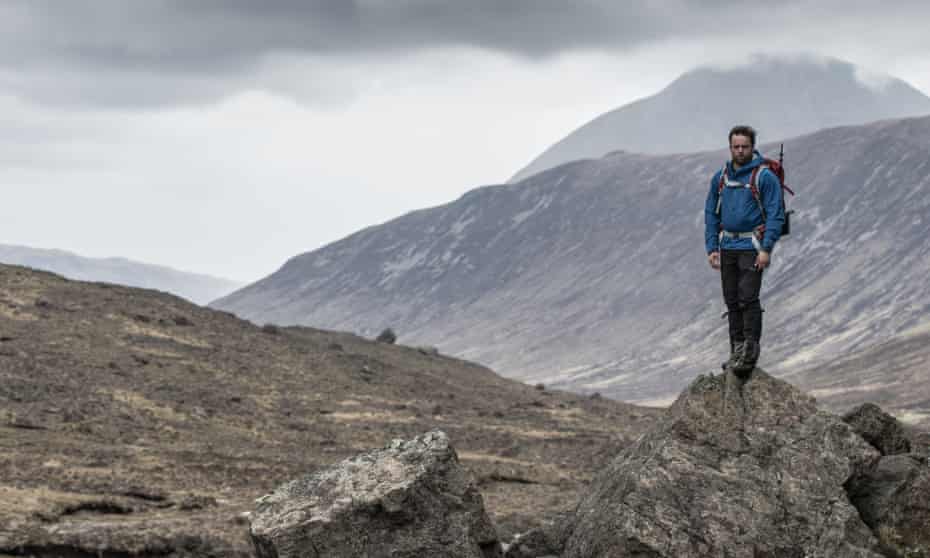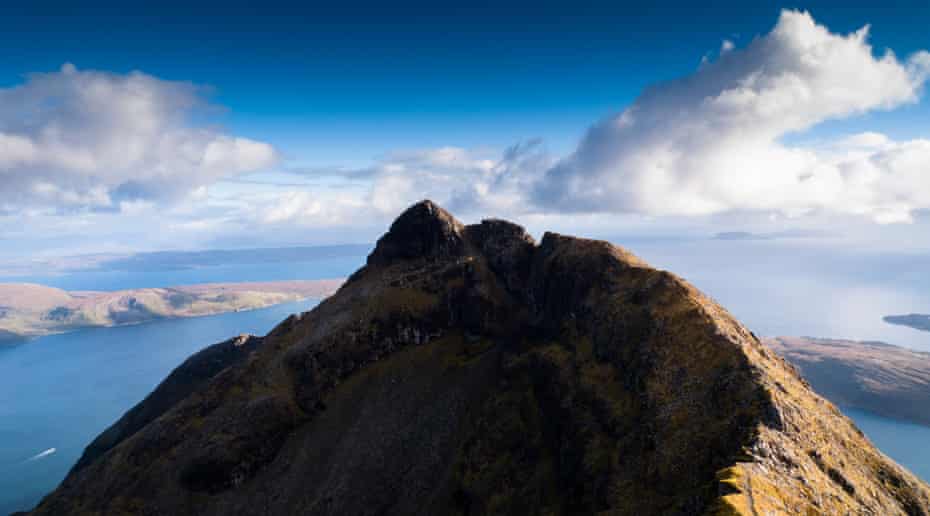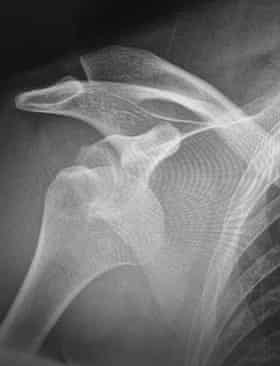‘I was sliding towards the drop and couldn’t stop’ – the writer who fell from a mountain

It is every climber’s worst nightmare. In this extract from his thrilling book about the glorious – and treacherous – Cuillin Ridge on Skye, Simon Ingram recalls the day its wild peaks almost took his life
Last modified on Wed 8 Sep 2021 05.09 EDT
I had been out of signal for most of the day, so when my phone suddenly stirred in my pocket, I decided to have a look. Remembering a climbing maxim – “Don’t try to do two things at once” – I shouted for my friend Kingsley to hang on, stopped and took out my mobile. The message was junk, but I took the opportunity to send some that weren’t and then check my voicemail.
Wandering absent-mindedly to where a boulder jutted off into the mist, I noticed Kingsley moving down the path. Shouting to alert him that I’d stopped, I brought the handset up to my ear and looked out at the cloud hanging off the Cuillin Ridge, waiting for the phone to connect. I took another step, just a small one to the left. And then everything went wrong.
As my left foot made contact with the rock, it flew out from beneath me. My leg swung up, pivoting the other away from the ground. For a split second I was airborne. My right arm flew back, hit the rock and, as my full weight followed, I felt something snap in my shoulder – a fibrous crack. I landed on my back, hard, and immediately began to slide. I realised I was moving towards the drop and couldn’t stop.

In a career spent walking in and writing about mountains, you do sometimes wonder what you would do if you fell. I lost a friend that way, so thinking about it is unavoidable. Would I scream? Would I go down with stoic acceptance – or flail and shriek, full of anger or fear? Nobody wants to find out. Of course, if you had the luxury of time, eventually your feelings might stop being about yourself and instead focus on those you were going to let down because of this selfishly dangerous activity. But nobody does that. When it happens, thinking is replaced by instinct, reflex and panic.
I screamed.
I couldn’t help it. Once when my arm hit the ground, then again as I started to fall and the rock bit through my pack and trousers. My jacket tore with a sound like parting Velcro. A single thought: Legs down, keep your legs down, don’t tip forward because your arm is bust. Then three words that still make me feel sick: Here it comes.
I slammed into the ground at the foot of the boulders, hard on my back. My pack compressed beneath me and pitched me on to my side, like a rebounding tyre. I gasped for breath with a loud croak. I’d been winded, badly. I saw my glasses land nearby. Then a cascade of white fluff began descending around me like snowfall. I realised my down vest, which I’d been wearing over my jacket for warmth, had shredded and spilled its contents on the way down.
I was alive. I was conscious. Almost reflexively, I leaped up and staggered a few steps, clutching my right arm with a sick fear in my gut. My legs worked. My back worked. I could move my neck. Then – like someone turning the volume up on a stereo – the pain hit. I fell into a crouch and yelled for Kingsley. The first shout was meek. I couldn’t gather enough air to push out the words. I gasped, tried again, and finally my voice rang out. “Kingsley! Help!”

I’d fallen about 50ft. A steep diagonal across the middle was where I must have bounced – a loss of momentum that could have saved my life. But I was hurt in a way I knew was serious. My right shoulder was dislocated, bone grinding against tendon and nerve. Mess with that and you risk turning a bad and very painful injury into a life-threatening emergency. And you don’t want an emergency in a place like this.
I knew all of this because I’d dislocated my shoulder before. All I needed was someone to put it back in and the pain would lessen enough for me to be able to move about, to get down. Before, I’d been in a city and it had been bad enough. Now I was halfway up the Cuillin Ridge on Skye, the most formidable and treacherous mountain range in Britain. More worrying still, there was another pain in there, a sharper, deeper one down my arm.
Suddenly Kingsley appeared. His expression changed from quizzical to slightly shocked. “Oh, I thought you were having me on. I heard you shout. What happened?” “I fell. I’ve dislocated my shoulder.” He looked up. “Fell from up there?” He shrugged. “Well, it definitely could have been worse.” Gamely, he started to fuss, loosening my rucksack and helping me slide it off. I yelped with pain.
“Do you think you can stand?” I was starting to chitter with cold or shock. “Let’s try.” He bent over to help and, as I pushed up, the pain sliced into my right side and I slumped back down, stars flashing against clamped eyelids. I could taste something metallic, nasty. Kingsley’s expression changed. “Are you going to be able to get down?” It was 3km to the car, through a steep, rock-choked valley. Nothing as a distance normally, but I couldn’t even stand. Above us, the cloud covering the top of the buttress of Sron na Ciche was starting to turn a weak bronze. Soon it would be getting dark. We had only packed for a quick jaunt. We didn’t have enough for a night out, nothing in the way of painkillers, and we’d eaten our meagre food. By now, I was shaking, light-headed, breathing quickly and sharply.
“Do you have a signal on your phone?” I asked. He pulled it from his pocket. “No.” “Mine’s over there somewhere, I think. Probably broken.” He rooted around among the rocks and found it. “Case is cracked, but phone intact. You have a signal.” I hesitated, as if pausing would improve things. Dark was creeping up from the valley as light was leaving the sky. I didn’t want to do this. But honestly – who was I kidding? “Call 999. Ask for Skye Mountain Rescue.”
It took 10 tries. Each time an operator would pick up, then connect us to the local police, as was protocol. Often a different voice each call. Then, just as some critical piece of information was being relayed, the signal would die. At first frustrated, then slightly desperate, Kingsley tried opening with the location – “Just beneath Lochan Coire Lagan” – in the hope they’d build the scenario. When the 10th attempt died mid-sentence, Kingsley swore. “Do you think they’re coming?” I asked. “Christ knows,” he said. “Surely we’ve given them everything they need.” He sat down next to me and patted my knee.

Right then, even through the pain, I hated myself. Hated that I couldn’t push through it and be like all those people who had crawled off lethal, ice-covered mountains with broken legs and pneumonia. I could imagine the alert going out to the mountain rescue team. The volunteers might be settling down for family dinners, putting their children to bed. And now they had to trek up into the Cuillin to rescue me, an idiot who clearly hadn’t been paying enough attention to what he was doing.
“Do you think I should call them again?” said Kingsley. I hesitated, then nodded. This time the connection held and the operator remembered us. Kingsley put him on speaker. “The mountain rescue team is gathering in Glen Brittle,” he said. “There’s a helicopter on its way.”
Helicopter? I shook my head. “I don’t need a helicopter. I just need someone who can put my shoulder back in.” A calm Scottish voice said: “You should take the helicopter. It will get you down a lot quicker. You’ve had a fall.” “But I could walk down if they just did something.” “You’ll need an X-ray. There could be complications. The team will assess you.”
Kingsley seemed to have just had several tonnes taken off his shoulders. He patted my knee again. “They’re coming. That’s the important thing.” He pulled out a silver hip flask. “Want some whisky? Cheapest I could find. It’s excellent.” I did. I wanted to down the whole thing. “I don’t know if this shaking thing is cold, or shock, or what,” I said. My words were sliding into each other and I was now trembling constantly. Kingsley draped his spare layer over me, pulled mine out of the bag and draped that over too, before jamming his hat on to my head. “Just hang in. They’re coming. But you know, it might get to the point where I’ll have to cuddle you.”

Then he stood up and looked about, as if realising where he was for the first time. The light was fading and with it the cloud was changing. He stood for a long moment, taking in the grandeur of the ridge and its seven miles of peaks. “It’s quite …’ He paused. “I mean, I can see why. Under different circumstances, it would be …” His voiced trailed off. I watched him look around in weary wonder, hands on hips, as night started to settle on the Cuillin.
Some time after that, we heard the deep beat of helicopter rotors in the distance. For a long time, they stayed muffled, then Kingsley said: “I can see it.” We saw its lights rise into view, then start to hunt around. Kingsley found a head torch and began to signal in broad sweeps. I was relieved, but then it became obvious something was wrong. “They can’t land,” Kingsley said. Then, with relief in his voice, he said: “Someone’s coming.”
Over the rocks ahead, a light appeared and with it a man wearing a helmet and a red waterproof, carrying a hefty box. Kingsley started talking at a gallop but the man held up his hands. “Gents,” he said, “I just need to catch my breath for a wee second.” Then he leaned in to me, inclining his head to look at my face closely, as if peering through a keyhole. “I’m Andy,” he said. “Can you tell me your name?”